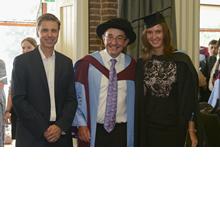"It's coming home to roost over the next 50 years or so. It's not just climate change; it's sheer space, places to grow food for this enormous horde." David Attenborough
There is a strong scientific consensus that we have changed the global climate since the industrial revolution; and a human population of over seven billion puts huge pressures the natural resources that provide our food, water and energy. A ‘Perfect Storm' is brewing: environmental scientists can shape humankind's response.
Students following this pathway examine past and present environmental change from the local level through to the global scale. Students can develop scientific understanding with an emphasis on the drivers and impacts of environmental change. Thus, this pathway considers human induced developments such as climate change, rising sea levels and ozone depletion in conjunction with natural climatic changes and long term change. Analysing these issues helps students to gain a deeper understanding of the magnitude of contemporary and predicted changes and strategies for mankind to mitigate or adapt. Techniques used to monitor environmental changes, such as field data, geographic information systems and satellite image analysis, can be explored and applied in student research work.
This pathway also encompasses the physical aspects of changing environments such as geomorphology, the sedimentary environment, hydrology, ocean circulation and environmental geology. The broad range of options available provides a balance between geology, geography and oceanography, with opportunities to apply the science you learn.
Year 1
Core Programme Modules (on all pathways)
Environmental Science: Concepts and Communication
Environmental Science: Research and Applications (field/practical module)
Environmental Field Techniques and Applications
Compulsory pathway modules
Year 2
Core Programme Modules (on all pathways)
Environmental Impact Assessment
Geographic Information Systems (GIS) for Environmental Scientists
Environmental Practice and Issues
Compulsory pathway module
Global climate change: science, impacts and policy
Optional modules:
Environmental Chemistry 1: Aquatic Chemistry
Remote sensing for earth observation
Coastal and estuarine oceanography 1
Coastal and estuarine oceanography 2
Quaternary environmental change
Geohazards and earth resources
Introduction to energy in the environment
Population in developing societies
Population and Reproductive Health
Business skills for employability
Management of risk and uncertainty
Year 3
Core Programme Modules (on all pathways)
Environmental Law and Management
Environmental Field Studies (MEnvSci Only)
Advanced Quantitative Methods (MEnvSci only)
Compulsory pathway modules:
Optional modules:
Biogeochemical cycles in the earth system
Environmental and Engineering Geology
Teaching and Communication and the UG Ambassador Scheme
Global Change Biology: from molecule to ecosystems
Complex socio-ecological systems: Past, present and future
Sustainable resource management
The Sustainability Professional
Adapting to Climate Change and Weather Hazards
Air Quality and Environmental Pollution
Year 4
Core Programme Modules (on all pathways)
Work Based Learning (work placement)
Optional modules:
Biogeochemical cycles in the earth system
Energy resources and engineering
Transport, Energy and the Environment
Environmental radioactivity and radiochemistry
Microfossils, environments and time
Coastal and maritime engineering and energy
Water and waste water engineering
What's related

I now work for the Met Office as a military weather forecaster at RAF Benson.

Each summer I was able to gain work experience all of which helped to ensure a consultancy career was for me.